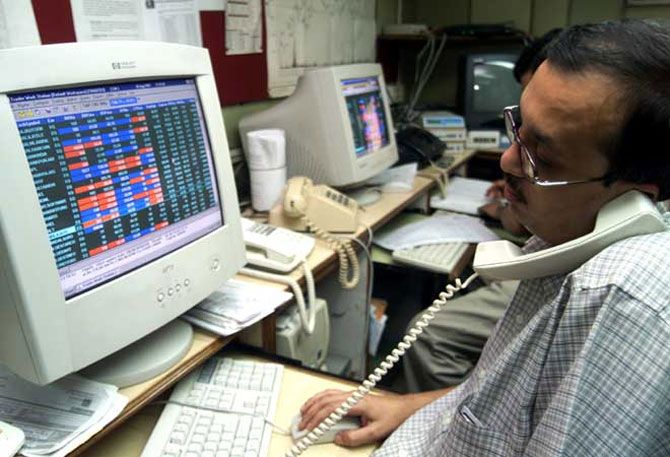'Investments are like motion pictures rather than still photographs.'
'Business dynamics keep evolving for better or for worse over time.'
'An investor's job is to keep a tab on these developments,' says Viraj Mehta, head-PMS and fund manager, Equirus Securities.

Investing includes many aspects such as scouting for ideas, screening them, research (which calls for scuttlebutt, or speaking to various stakeholders of a company), valuation, portfolio allocation, and efficient execution of trades (buying and selling).
Most investment-related writing is devoted to screening, research and the valuation part of investing -- aspects that are much more objective and scientific in nature.
On the other hand, portfolio allocation and execution, especially selling, involve much more subjectivity.
Lesser material is available on the art of selling. Even media discussions focus more on research and buying.
Experts offer buying tips, but rarely speak about the stocks they have sold.
The idea of holding on to investments for the long term, especially when a company's operational performance meets or exceeds expectations, is very attractive.
But as most experienced investors know, not all companies perform as expected.
Real businesses are affected by domestic as well as global economic cycles, government policy actions, commodity and currency volatility, trade wars, corporate actions, and a lot more.
While some businesses are resilient to adverse climates, very few are antifragile (those that become stronger during bad times), and most are susceptible.
In such times, it is important for the investor to have a framework that enables him to take calibrated actions.
Selling is as important, if not more, than research and buying. (Please note that this article is not about short selling.)
Let us next deal with the various reasons, apart from personal exigencies, due to which an investor should consider selling the stocks in his portfolio.
Returns are front-ended:
Sometimes, the investment thesis plays out faster than expected, leading to front-ended returns.
Especially during bull markets, stocks take off as soon as one buys them.
Within a matter of a few months or quarters the stock is up 50 per cent, 100 per cent, or even more above the buying price.
At this point, prices run ahead of fundamentals.
The risk-reward ratio at the current price is not as favourable as it was at the time of purchase.
This can lead to price or time corrections.
Initial thesis is wrong:
Sometimes the initial thesis is wrong and hence the investment does not play out as expected.
Any investment decision involves making a few assumptions about the company's future performance, or some event playing out.
Many a times, these assumptions do not play out according to expectations.
An investment thesis should be thought of as a three-legged stool.
If any one of the legs is broken, the stool cannot stand.
Investors should be careful about coming up with new points to support a thesis that is patently wrong, barring in exceptional circumstances.
Adverse changes in circumstances:
Sometimes the business environment changes, making it unlikely that the expected returns will materialise from the investment, though the stock remains fairly valued.
Sometimes, there are adverse changes in government policies, which mar the economics of the business or the company.
Sometimes, the actions of the management can make a company less attractive.
For instance, it may undertake very high capital expenditure funded with debt and/or external equity, but which does not result in the expected growth.
Any other such incorrect capital allocation decision can also make a company less attractive.
Businesses keep changing and evolving due to many dynamic factors.
When such developments occur, investors should revisit their original thesis and evaluate it critically, without being influenced by various psychological biases.
A better opportunity arises:
Whenever one is fully invested, and a better opportunity comes along, it is logical to replace the least attractive idea in the portfolio with the new one.
However, one should be careful before letting in a new idea.
An investor is (ideally) much more familiar with his present investments than with a newer one.
A new idea should only be included in the portfolio when it presents a significantly better risk-reward proposition than an existing stock in the portfolio.
Investments are like motion pictures rather than still photographs.
Business dynamics keep evolving for better or for worse over time.
An investor's job is to keep a tab on these developments. S/he should remove the stocks whose fundamentals have deteriorated, and hold on to or add to the ones that are on course or improving.
In other words, the investor should water the flowers and cut the weeds.
At the same time, investors should remember that business fundamentals do not change as fast as share prices.
There will be long periods of time when there will be no actionable insights.
Such periods may last for a few quarters or even for a few years.
These are the times when one needs to stay patient, confident, alert, and wait for the market to correct the mispricing.
Investors should also bear in mind that stocks may sometimes go up, for the right or wrong reasons, after you have sold them, especially in bull markets.
Mistakes will be made on both sides of the trade.
There will be pain.
But rather than being bogged down, investors should stick to a sound investment process which over the long run will produce satisfactory results.
Kindly note the photograph has only been published for representational purposes.











 © 2025
© 2025